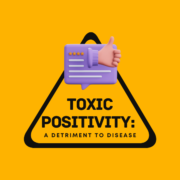Toxic Positivity: A Detriment to Disease
I remember when I was first diagnosed with thyroid cancer back in 2017. I had been working for a primary care office at the time, so I knew I was in good hands with the doctors I worked with when I asked for a referral for whom they thought would be the best person to treat me. When I told them I had thyroid cancer, however, I got responses such as, “Oh, you have the ‘good’ cancer,” and, “If there were a cancer to get, thyroid would be it.” I took these responses to heart, even though many years later, I knew I shouldn’t have. However, I was a naive, young patient who didn’t have any symptoms, much less anything about cancer. What I failed to realize was what these responses were, or “toxic positivity.”
Toxic positivity is defined by Psychology Today as, “the act of avoiding, suppressing, or rejecting negative emotions or experiences. This may take the form of denying your own emotions or someone else denying your emotions, insisting on positive thinking instead.” In other words, we downplay our emotions, specifically if they are negative, in order to appear positive. This can have many detrimental effects including leading to feelings of shame, guilt, and avoiding true human emotion(s). I remember not being scared of my diagnosis, more aloof than anything. I had accepted that cancer was now, and forever would be, a part of my life, and that maybe I did have the “easy one.” However, I’m realizing that I may have been engaging in my own form of toxic positivity in order to appear as if I had it all together.
However, when someone is diagnosed with a disease as detrimental as cancer, it’s important to not put on such a facade as “positive vibes only,” although I am definitely guilty of having art in my home with such a phrase. Being diagnosed with cancer is hard amongst other defeating human emotions. It’s imperative that we recognize that, and that we don’t shame or blame ourselves for not being “happy” or “positive” all the time. Hiding our emotions and how we truly feel prevents us from being authentic and from experiencing growth as humans.
So how do we be kinder to ourselves and to others who are experiencing a difficult diagnosis such as cancer?
- Own your story and all of its parts, both positive and negative
- Don’t deny reality
- Be gentle and kind with yourself
- Tell others exactly how you’re feeling
- Don’t shy away from “emotions” for fear of guilt or shame
- Don’t minimize
- Don’t be dismissive of others if they do engage in toxic positivity; rather, talk it out
- Focus on helping others through active listening
- Validate others’ feelings
- Know that more than one feeling can be true at the same time, for example being scared, yet hopeful
Carly Flumer is a young woman who was diagnosed with stage I papillary thyroid cancer at the age of 27. She recently received her Master’s degree from Boston University in Health Communication and received her Bachelor’s from George Mason University in Health Administration and Policy. While being diagnosed with the “C” word at such a young age was a surprise, as it would be to anyone, she found strength, support, and inspiration in sharing her cancer journey on social media. As a result of her health outcome, she looks to advocate for other cancer patients through education, research, and health literacy.




